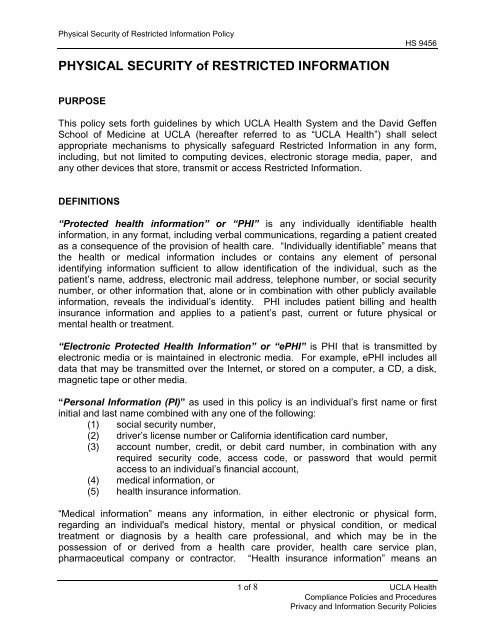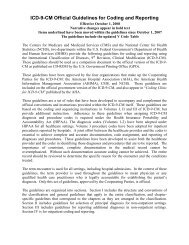Medical Records - Office of Compliance Services - UCLA Health
Medical Records - Office of Compliance Services - UCLA Health
Medical Records - Office of Compliance Services - UCLA Health
Create successful ePaper yourself
Turn your PDF publications into a flip-book with our unique Google optimized e-Paper software.
Physical Security <strong>of</strong> Restricted Information Policy<br />
HS 9456<br />
PHYSICAL SECURITY <strong>of</strong> RESTRICTED INFORMATION<br />
PURPOSE<br />
This policy sets forth guidelines by which <strong>UCLA</strong> <strong>Health</strong> System and the David Geffen<br />
School <strong>of</strong> Medicine at <strong>UCLA</strong> (hereafter referred to as “<strong>UCLA</strong> <strong>Health</strong>”) shall select<br />
appropriate mechanisms to physically safeguard Restricted Information in any form,<br />
including, but not limited to computing devices, electronic storage media, paper, and<br />
any other devices that store, transmit or access Restricted Information.<br />
DEFINITIONS<br />
“Protected health information” or “PHI” is any individually identifiable health<br />
information, in any format, including verbal communications, regarding a patient created<br />
as a consequence <strong>of</strong> the provision <strong>of</strong> health care. “Individually identifiable” means that<br />
the health or medical information includes or contains any element <strong>of</strong> personal<br />
identifying information sufficient to allow identification <strong>of</strong> the individual, such as the<br />
patient’s name, address, electronic mail address, telephone number, or social security<br />
number, or other information that, alone or in combination with other publicly available<br />
information, reveals the individual’s identity. PHI includes patient billing and health<br />
insurance information and applies to a patient’s past, current or future physical or<br />
mental health or treatment.<br />
“Electronic Protected <strong>Health</strong> Information” or “ePHI” is PHI that is transmitted by<br />
electronic media or is maintained in electronic media. For example, ePHI includes all<br />
data that may be transmitted over the Internet, or stored on a computer, a CD, a disk,<br />
magnetic tape or other media.<br />
“Personal Information (PI)” as used in this policy is an individual’s first name or first<br />
initial and last name combined with any one <strong>of</strong> the following:<br />
(1) social security number,<br />
(2) driver’s license number or California identification card number,<br />
(3) account number, credit, or debit card number, in combination with any<br />
required security code, access code, or password that would permit<br />
access to an individual’s financial account,<br />
(4) medical information, or<br />
(5) health insurance information.<br />
“<strong>Medical</strong> information” means any information, in either electronic or physical form,<br />
regarding an individual's medical history, mental or physical condition, or medical<br />
treatment or diagnosis by a health care pr<strong>of</strong>essional, and which may be in the<br />
possession <strong>of</strong> or derived from a health care provider, health care service plan,<br />
pharmaceutical company or contractor. “<strong>Health</strong> insurance information” means an<br />
1 <strong>of</strong> 8 <strong>UCLA</strong> <strong>Health</strong><br />
<strong>Compliance</strong> Policies and Procedures<br />
Privacy and Information Security Policies
Physical Security <strong>of</strong> Restricted Information Policy<br />
HS 9456<br />
individual's health insurance policy number or subscriber identification number, any<br />
unique identifier used by a health insurer to identify the individual, or any information in<br />
an individual's application and claims history, including any appeals records. <strong>Medical</strong><br />
information and health insurance information for patients are also considered to be PHI.<br />
“Restricted Information” (as defined by UC Policy IS-3, Electronic Information<br />
Security) describes any confidential or Personal Information that is protected by law or<br />
policy and that requires the highest level <strong>of</strong> access control and security protection,<br />
whether in storage or in transit. This includes Personal Information, PHI and ePHI as<br />
defined in this section but could also include other types <strong>of</strong> information such as research<br />
data.<br />
“Authorized Personnel” means the designated IT support person or group for an area.<br />
For hospital areas, this would be <strong>Medical</strong> Information Technology <strong>Services</strong> (MITS); for<br />
School <strong>of</strong> Medicine departments, it would be the departmental Computer Support<br />
Coordinator (CSC); for areas supported by the School <strong>of</strong> Medicine IT Service<br />
(SOMITS), it would be SOMITS.<br />
“Computer Support Coordinator” is any group or person responsible for supporting<br />
any host connected to MedNet.<br />
“Server” refers to a host that provides some service for other hosts connected to it via<br />
the network.<br />
“Workstation” is a <strong>UCLA</strong> <strong>Health</strong> desktop or laptop computer.<br />
POLICY<br />
I. Physical access to systems containing Restricted Information must be controlled<br />
as carefully as possible. Computers which are housed in leased property or<br />
which are accessed by contract cleaning and maintenance services need to be<br />
carefully secured. Access to secure locations should be limited to authorized<br />
users only, and logs to track ingress and egress from locations should be<br />
maintained.<br />
II.<br />
III.<br />
Large enterprise system servers containing Restricted Information should be<br />
physically located in pr<strong>of</strong>essionally managed secure locations that have<br />
provisions for the prevention, detection, early warning <strong>of</strong> and recovery from<br />
emergency conditions.<br />
Smaller systems such as departmental servers, to the extent possible, should be<br />
stored in data centers, secured equipment rooms, locked <strong>of</strong>fices or in other areas<br />
with limited or restricted access. Keys to the server areas should be tightly<br />
controlled and distributed only to a limited number <strong>of</strong> staff.<br />
2 <strong>of</strong> 8 <strong>UCLA</strong> <strong>Health</strong><br />
<strong>Compliance</strong> Policies and Procedures<br />
Privacy and Information Security Policies
Physical Security <strong>of</strong> Restricted Information Policy<br />
HS 9456<br />
IV.<br />
Desktops and laptops are by definition not housed in secure areas, and therefore<br />
unencrypted Restricted Information should not be stored on desktops or laptops<br />
if a network server is available. (See: HS Policy No. 9451, “Use <strong>of</strong> Electronic<br />
Information by Workforce.”)<br />
V. Secure physical access locations must limit access to authorized users and have<br />
physical access controls such as locks, electronic key readers, or other access<br />
control mechanisms. <strong>UCLA</strong> <strong>Health</strong> should maintain logs to track ingress and<br />
egress (with the exception <strong>of</strong> routine daily activities).<br />
VI.<br />
VII.<br />
VIII.<br />
IX.<br />
<strong>UCLA</strong> <strong>Health</strong> shall log all systems maintenance services.<br />
Wireless network access points should be protected from unauthorized access<br />
and transmissions should be encrypted (see: HS Policy No. 9457, “Information<br />
Technology Security”).<br />
Where feasible, laptops and other mobile devices should be physically secured<br />
with cables or other lockdown devices.<br />
Access to non-public areas with servers and workstations containing Restricted<br />
Information should be limited to staff who are assigned to work in that area, or<br />
with a job-related reason for being in the area. Visitors and vendors to these<br />
areas should wear appropriate identification badges, and should be accompanied<br />
by <strong>UCLA</strong> <strong>Health</strong> staff at all times. <strong>UCLA</strong> <strong>Health</strong> should maintain logs to track<br />
visitors and vendors entering and exiting the non-public areas.<br />
X. Individuals physically accessing <strong>UCLA</strong> <strong>Health</strong> computer resources should be<br />
requested to provide a valid <strong>UCLA</strong> <strong>Health</strong> Identification badge.<br />
Physical access to Restricted Information in paper and other formats should be<br />
controlled in a similar manner as for electronic devices. HS Policy No. 9401,<br />
“Protection <strong>of</strong> Patient Information” lists additional physical security measures for<br />
PHI, many <strong>of</strong> which are also applicable to Restricted Information.<br />
XI.<br />
Devices and media containing Restricted Information must always be disposed <strong>of</strong><br />
securely.<br />
PROCEDURE<br />
I. Data Centers and Other Secure Locations<br />
A. <strong>UCLA</strong> <strong>Health</strong> servers containing Restricted Information should be<br />
physically located in pr<strong>of</strong>essionally managed secure locations that have<br />
provisions for the prevention, detection, early warning <strong>of</strong> and recovery<br />
3 <strong>of</strong> 8 <strong>UCLA</strong> <strong>Health</strong><br />
<strong>Compliance</strong> Policies and Procedures<br />
Privacy and Information Security Policies
Physical Security <strong>of</strong> Restricted Information Policy<br />
HS 9456<br />
from emergency conditions created by earthquake, fire, water, leakage or<br />
flooding, power disruption, air conditioning failure, or other hazards.<br />
To the extent possible, servers should be stored in secure data centers or<br />
equipment rooms.<br />
B. <strong>UCLA</strong> <strong>Health</strong> should record any maintenance repairs and modification to<br />
physical components <strong>of</strong> the facility related to security such as hardware,<br />
walls, doors and locks.<br />
C. <strong>UCLA</strong> <strong>Health</strong> should record any relocation <strong>of</strong> hardware and electronic<br />
media. <strong>UCLA</strong> <strong>Health</strong> should ensure the backup <strong>of</strong> any data before a<br />
relocation <strong>of</strong> equipment. The Department CSC or IT Coordinator is<br />
responsible for maintaining records for hardware and s<strong>of</strong>tware.<br />
D. Outside approved data centers, reasonable technical and security<br />
measures should be implemented to secure <strong>UCLA</strong> <strong>Health</strong> data and<br />
systems. A Business Associate Agreement must be executed for all<br />
outside third party data centers storing ePHI. When Restricted<br />
Information is involved, language to protect the confidentiality, integrity<br />
and availability <strong>of</strong> the Restricted Information should be included in<br />
contracts.<br />
II.<br />
Workstation Security<br />
A. Workstation Use.<br />
i. Workstations containing Restricted Information or which are utilized<br />
to access the <strong>UCLA</strong> <strong>Health</strong> network must be secured with a<br />
password.<br />
ii. If Workforce members step away from their workstation, they must<br />
log-<strong>of</strong>f the applications and invoke a screensaver lock function.<br />
This also applies to home computers utilizing VPN to access <strong>UCLA</strong><br />
<strong>Health</strong> systems.<br />
iii. Workstations must automatically invoke a password-protected<br />
screensaver time out after 15 minutes <strong>of</strong> inactivity. Requests for<br />
longer time outs must be approved by the Information Security<br />
<strong>Office</strong>r. Workstations in areas where the public may see the<br />
Restricted Information should be set up to “Timeout” after only one<br />
minute <strong>of</strong> inactivity.<br />
iv. Once the screensaver is invoked, the Workforce member must reauthenticate<br />
to the network and applications with his/her User ID<br />
and password.<br />
4 <strong>of</strong> 8 <strong>UCLA</strong> <strong>Health</strong><br />
<strong>Compliance</strong> Policies and Procedures<br />
Privacy and Information Security Policies
Physical Security <strong>of</strong> Restricted Information Policy<br />
HS 9456<br />
B. Workstation Location.<br />
i. Workstations should be positioned so that unauthorized individuals<br />
cannot readily view them. Workforce members should also position<br />
any portable devices so that the screens are not visible to<br />
unauthorized individuals or the public when in use. As much as<br />
possible, privacy screens should be utilized in areas accessible by<br />
the public.<br />
ii. As much as possible, workstations located in an open <strong>of</strong>fice<br />
environment should be physically secured with anti-theft devices,<br />
such as locking cables, placed in locked cabinets, or secured via<br />
other locking mechanisms.<br />
iii. Workstation loss or theft must be reported immediately to the<br />
department supervisor and to the Privacy and Information Security<br />
<strong>Office</strong>s (PrivacyInfoSec@mednet.ucla.edu). Any thefts must also<br />
be reported to the <strong>UCLA</strong> Police Department. (See: HS Policy No.<br />
9459, “Privacy and Information Security Incident Reporting”).<br />
iv. Workstations in an open <strong>of</strong>fice environment or in areas accessible<br />
to the public must not be left unattended unless securely locked.<br />
III.<br />
Device and Media Controls and Accountability<br />
A. Departments are responsible for maintaining inventory records for<br />
computing equipment. To the extent possible, such records should<br />
contain the names <strong>of</strong> the individuals to whom the equipment has been<br />
assigned.<br />
B. The responsible parties should maintain inventories <strong>of</strong> electronic media<br />
(DVDs, CDs, USB drives, magnetic tape) that contains Restricted<br />
Information.<br />
C. Hardware that contains Restricted Information should not be sent out <strong>of</strong><br />
the facility for service without the appropriate safeguards.<br />
D. Leased or vendor equipment that contains Restricted Information should<br />
not leave the premises before all the Restricted Information has been<br />
securely deleted (see below) or other arrangements for secure disposal<br />
have been made with the vendor.<br />
E. Hardware or media that contains Restricted Information should not be<br />
recycled, sold, or donated unless all Restricted Information is first securely<br />
deleted. Workstation, laptops and hard drives should not be re-issued to<br />
other users without first securely deleting all Restricted Information on the<br />
devices that the new user does not need to perform his/her duties.<br />
5 <strong>of</strong> 8 <strong>UCLA</strong> <strong>Health</strong><br />
<strong>Compliance</strong> Policies and Procedures<br />
Privacy and Information Security Policies
Physical Security <strong>of</strong> Restricted Information Policy<br />
HS 9456<br />
F. Contact the Information Security <strong>Office</strong> (InfoSecAll@mednet.ucla.edu) for<br />
information on how to securely delete Restricted Information.<br />
IV.<br />
Secure Disposal<br />
A. All devices and media containing Restricted Information should be<br />
disposed <strong>of</strong> securely.<br />
i. Workforce members in Hospital areas should call the MITS Help<br />
Desk to arrange for pick up <strong>of</strong> devices and media containing<br />
Restricted Information for secure disposal.<br />
ii.<br />
Workforce members in other areas should call their local IT support<br />
group for instructions on secure disposal.<br />
iii. Contact the Information Security <strong>Office</strong><br />
(InfoSecAll@mednet.ucla.edu) for information on how to dispose <strong>of</strong><br />
media and hardware securely.<br />
B. The only secure disposal method for paper Restricted Information is<br />
cross-cut shredding. Depositing the documents in a locked shredding<br />
container the contents <strong>of</strong> which will be shredded by a <strong>UCLA</strong> <strong>Health</strong><br />
certified third party vendor will meet this requirement.<br />
V. Media Re-use<br />
i. Paper documents with Restricted Information must never be<br />
discarded in recycling bins or regular trash cans.<br />
ii. Collection bins for paper documents with Restricted Information<br />
that will later be shredded should be locked.<br />
iii. Workforce members should ask their supervisors for instructions on<br />
disposing <strong>of</strong> paper documents with Restricted Information in their<br />
areas.<br />
A. Restricted information stored on any electronic devices or media must be<br />
securely deleted before the devices or media can be re-used. Hard drives<br />
should not be reused unless all the Restricted Information is first securely<br />
deleted. Backup tapes from one area should not be re-used in another<br />
until they have been securely wiped.<br />
B. Contact your IT support group or the Information Security <strong>Office</strong><br />
(InfoSecAll@mednet.ucla.edu) for information on how to dispose <strong>of</strong> media<br />
and hardware securely.<br />
6 <strong>of</strong> 8 <strong>UCLA</strong> <strong>Health</strong><br />
<strong>Compliance</strong> Policies and Procedures<br />
Privacy and Information Security Policies
Physical Security <strong>of</strong> Restricted Information Policy<br />
HS 9456<br />
VI.<br />
VII.<br />
VIII.<br />
Data Backup and Storage<br />
If the only copy <strong>of</strong> Restricted Information is on hardware or electronic media to be<br />
moved, an exact retrievable copy <strong>of</strong> the Restricted Information should be created<br />
before moving the hardware or electronic media.<br />
Enforcement<br />
Failure to follow any provisions <strong>of</strong> this policy may result in disciplinary action, up<br />
to and including termination.<br />
Questions<br />
Consult your supervisor, IT support group or the Privacy and Information Security<br />
<strong>Office</strong>s (PrivacyInfoSec@mednet.ucla.edu) if you have any questions on this<br />
policy.<br />
REFERENCES<br />
<strong>Health</strong> Insurance Portability and Accountability Act, 45 CFR 160-164<br />
University <strong>of</strong> California Business and Finance Bulletin IS-3, Electronic Information<br />
Security<br />
University <strong>of</strong> California Electronic Communications Policy (ECP)<br />
CONTACT<br />
Chief Privacy <strong>Office</strong>r, <strong>Compliance</strong> <strong>Office</strong><br />
Chief Information Security <strong>Office</strong>r, <strong>Compliance</strong> <strong>Office</strong><br />
REVISION HISTORY<br />
Approved: February 22, 2006<br />
Effective Date: April 20, 2005<br />
Revised Date: November 2005; June 21, 2007; May 30, 2008, March 31, 2011<br />
7 <strong>of</strong> 8 <strong>UCLA</strong> <strong>Health</strong><br />
<strong>Compliance</strong> Policies and Procedures<br />
Privacy and Information Security Policies
Physical Security <strong>of</strong> Restricted Information Policy<br />
HS 9456<br />
APPROVAL<br />
<strong>Health</strong> Sciences Enterprise <strong>Compliance</strong> Oversight Board<br />
Approved 12/11/2010<br />
David Feinberg, MD<br />
CEO and Associate Vice Chancellor<br />
<strong>UCLA</strong> Hospital System<br />
Randolph Steadman, MD<br />
Chief <strong>of</strong> Staff<br />
Ronald Reagan <strong>UCLA</strong> <strong>Medical</strong> Center<br />
Denise Sur, MD<br />
Chief <strong>of</strong> Staff<br />
Santa Monica-<strong>UCLA</strong> <strong>Medical</strong> Center and Orthopaedic hospital<br />
James J. McGough, MD<br />
Chief <strong>of</strong> Staff<br />
Resnick Neuropsychiatric Hospital at <strong>UCLA</strong><br />
8 <strong>of</strong> 8 <strong>UCLA</strong> <strong>Health</strong><br />
<strong>Compliance</strong> Policies and Procedures<br />
Privacy and Information Security Policies
















